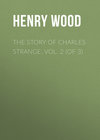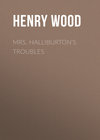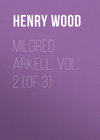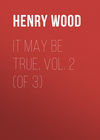Czytaj książkę: «The Channings», strona 13
“It is an utter impossibility that Yorke could have taken it, even were he capable of such a thing,” generously spoke Arthur. “From the time you left the office yourself, sir, until after the letters were taken out of it to be posted, he was away from it.”
“Just like him!” exclaimed Mr. Galloway. “It must have been done while your brother Hamish was waiting in the office. We must ascertain from him who came in.”
“He told me no one came in,” repeated Arthur.
“Rubbish!” testily observed Mr. Galloway. “Some one must have come in; some one with light fingers, too! the money could not go without hands. You are off to college now, I suppose, Channing?”
“Yes, sir.”
“When service is over, just go down as far as your brother’s office, and ask him about it.”
“He is as obstinate as any old adder!” exclaimed Roland Yorke to Arthur, when they left Mr. Galloway alone. “The only possible way in which it can have gone, is through that post-office. The men have forked it; as they did Lady Augusta’s pills.”
“He says it was not the post-office,” mused Arthur. “He said—as I understood—that the telegraphic despatch proved to him that it had been taken out here.”
“What an idiot you are!” ejaculated Roland. “How could a despatch tell him who took it, or who did not?—unless it was a despatch from those spirit-rappers—mesmerists, or whatever they call themselves. They profess to show you who your grandmother was, if you don’t know!”
Roland laughed as he spoke. Arthur was not inclined for joking; the affair perplexed him in no ordinary degree. “I wish Mr. Galloway would mention his grounds for thinking the note was taken before it went to the post!” he said.
“He ought to mention them,” cried Roland fiercely. “He says he learns, by the despatch, that the letter was not opened after it left this office. Now, it is impossible that any despatch could tell him that. He talks to me about broad assertions! That’s a pretty broad one. What did the despatch say? who sent it?”
“Would it afford you satisfaction to know, Mr. Roland?” and Roland wheeled round with a start, for it was the voice of Mr. Galloway. He had followed them into the front office, and caught the latter part of the conversation. “Come, sir,” he added, “I will teach you a lesson in caution. When I have sealed letters that contained money after they were previously fastened down with gum, I have seen you throw your head back, Mr. Roland, with that favourite scornful movement of yours. ‘As if gum did not stick them fast enough!’ you have said in your heart. But now, the fact of my having sealed this letter in question, enables me to say that the letter was not opened after it left my hands. The despatch you are so curious about was from my cousin, telling me that the seal reached him intact.”
“I did not know the letter was sealed,” remarked Roland. “But that proves nothing, sir. They might melt the wax, and seal it up again. Every one keeps a stamp of this sort,” he added, stretching his hand out for the seal usually used in the office—an ordinary cross-barred wafer stamp.
“Ah,” said Mr. Galloway, “you are very clever, Master Roland. But I happened to stamp that letter with my own private seal.”
“That alters the case, of course,” said Roland, after a pause. “Sir, I wish you would set me to work to find out,” he impulsively continued. “I’d go to the post-office, and—”
“And there make enough noise for ten, and defeat your own ends,” interrupted Mr. Galloway. “Channing, you will be late. Do not forget to see Hamish.”
“Yes, I must be off,” said Arthur, coming out of his reverie with a start. He had waited to hear about the seal. And now flew towards the cathedral.
“I wish it had not happened!” he ejaculated. “I know Galloway does not suspect me or Yorke: but still I wish it had never happened!”
CHAPTER XX. – THE LOOMING OF AN AWFUL FEAR
Hamish Channing sat in his private room; his now; for, in the absence of Mr. Channing, Hamish was master. The insurance office was situated in Guild Street, a principal street, near to the Town Hall. It consisted of an entrance hall, two rooms, and a closet for hanging up coats, and for washing hands. The room on the left of the hall, as you entered, was the principal office; the room on the right, was the private room of Mr. Channing; now used, I say, by Hamish. The upper part of the house was occupied as a dwelling; the people renting it having nothing to do with the office. It was a large, roomy house, and possessed a separate entrance.
Hamish—gay, good-tempered, careless, though he was—ruled the office with a firm hand. There was no familiarity of manner there; the clerks liked him, but they had to defer to him and obey him. He was seated at his desk, deep in some accounts, on this same morning—the one mentioned in the last chapter—when one of the clerks entered, and said that Mr. Arthur Channing was asking to speak to him: for it was Mr. Hamish Channing’s good pleasure not to be interrupted indiscriminately, unless a clerk first ascertained whether he was at liberty to be seen. Possibly Hamish feared treachery might be abroad.
Arthur entered. Hamish pushed his books from him, and stretched himself. “Well, old fellow! you seem out of breath.”
“I came down at a pace,” rejoined Arthur. “College is just over. I say, Hamish, a disagreeable thing has happened at Galloway’s. I have never seen him put out as he is now.”
“Has his hair taken a change again, and come out a lovely rose colour?”
“I wish you would not turn everything into joke,” cried Arthur, who was really troubled, and the words vexed him. “You saw a letter on Jenkins’s desk last Friday—the afternoon, you know, that Yorke went off, and you remained while I went to college? There was a twenty-pound note in it. Well, the note has, in some mysterious manner, been abstracted from it.”
Hamish lifted his eyebrows. “What can Galloway expect, if he sends bank-notes in letters?”
“Yes, but this was taken before it left our office. Galloway says so. He sealed it with his private seal, and the letter arrived at his cousin’s intact, the seal unbroken—a pretty sure proof that the note could not have been in it when it was sealed.”
“Who took it out?” asked Hamish.
“That’s the question. There was not a soul near the place, that I can find out, except you and I. Yorke was away, Jenkins was away, and Mr. Galloway was away. He says some one must have come in while you were in the office.”
“Not so much as a ghost came in,” said Hamish.
“Are you sure, Hamish?”
“Sure! I am sure they did not, unless I dropped asleep. That was not an unlikely catastrophe to happen; shut up by myself in that dull office, amidst musty parchments, with nothing to do.”
“Hamish, can you be serious for once? This is a serious matter.”
“Mr. Martin Pope wants you, sir,” said the clerk again, interrupting at this juncture. Martin Pope’s face came in also, over the clerk’s shoulder. It was red, and he looked in a hurry.
“Hamish, he has had a letter, and is off by the half-past eleven train,” spoke Martin Pope, in some excitement. “You must rush up to the station, if you want a last word with him. You will hardly catch him, running your best.”
Up jumped Hamish, in excitement as great as his friend’s. He closed and locked the desk, caught his hat, and was speeding out of the office, when Arthur, to whom the words had been a puzzle, seized his arm.
“Hamish, did any one come in? It was Mr. Galloway sent me here to ascertain.”
“No, they did not. Should I not tell you if they had? Take care, Arthur. I must fly like the wind. Come away, Pope!”
Arthur walked back to Mr. Galloway’s. That gentleman was out. Roland Yorke was out. But Jenkins, upon whom the unfortunate affair had taken great hold, lifted his face to Arthur, his eyes asking the question that his tongue scarcely presumed to do.
“My brother says no one came in while he was here. It is very strange!”
“Mr. Arthur, sir, if I had repined at all at that accident, and felt it as a misfortune, how this would have reproved me!” spoke Jenkins, in his simple faith. “Why, sir, it must have come to me as a mercy, a blessing; to take me away out of this office at the very time.”
“What do you mean, Jenkins?”
“There’s no telling, sir, but Mr. Galloway might have suspected me. It is the first loss we have had since I have been here, all these years; and—”
“Nonsense!” interrupted Arthur. “You may as well fear that Mr. Galloway will suspect me, or Mr. Yorke.”
“No, sir, you and Mr. Yorke are different; you are gentlemen. Mr. Galloway would no more suspect you, than he would suspect himself. I am thankful I was absent.”
“Be easy, Jenkins,” smiled Arthur. “Absent or present, every one can trust you.”
Mr. Galloway did not return until nearly one o’clock. He went straight to his own room. Arthur followed him.
“I have seen Hamish, sir. He says no person whatever entered on Friday, while he was here alone.”
Mr. Galloway paused, apparently revolving the news. “Hamish must be mistaken,” he answered.
“He told me at the time, last Friday, that no one had been in,” resumed Arthur. “I asked the question when I returned from college, thinking people might have called on business. He said they had not done so; and he says the same now.”
“But look you here, Arthur,” debated Mr. Galloway, in a tone of reasoning. “I suspect neither you nor Yorke; indeed, as it seems, Yorke put himself out of suspicion’s way, by walking off; but if no one came to the office, and yet the note went, remember the position in which you place yourself. I say I don’t blame you, I don’t suspect you; but I do say that the mystery must be cleared up. Are you certain no person came into the office during your presence in it?”
“I am quite certain of that, sir. I have told you so.”
“And is Hamish equally certain—that no one entered while he was here alone?”
“He says so.” But Arthur’s words bore a sound of hesitation, which Mr. Galloway may or may not have observed. He would have spoken far more positively had Hamish not joked about it.
“‘Says’ will not do for me,” retorted Mr. Galloway. “I should like to see Hamish. You have nothing particular to finish before one o’clock; suppose you run up to Guild Street, and request him to come round this way, as he goes home to dinner? It will not take him two minutes out of his road.”
Arthur departed; choosing the nearest way to Guild Street. It led him through the street Hamish had been careful to avoid on account of a troublesome creditor. Arthur had no such fear. One o’clock struck as he turned into it. About midway down it, what was his astonishment at encountering Hamish! Not hurrying along, dreading to be seen, but flourishing leisurely at his ease, nodding to every one he knew, his sweet smile in full play, and his cane whirling circlets in the air.
“Hamish! I thought this was forbidden ground!”
“So it was, until a day or two ago,” laughed Hamish; “but I have managed to charm the enemy.”
He spoke in his usual light, careless, half-mocking style, and passed his arm within Arthur’s. At that moment a shopkeeper came to his door, and respectfully touched his hat to Hamish. Hamish nodded in return, and laughed again as he walked on with Arthur.
“That was the fiercest enemy in all this street of Philistines, Arthur. See how civil he is now.”
“How did you ‘charm’ him?”
“Oh, by a process known to myself. Did you come down on purpose to escort me home to dinner? Very polite of you!”
“I came to ask you to go round by Mr. Galloway’s office, and to call in and see him. He will not take your word at second hand.”
“Take my word about what?” asked Hamish.
“That the office had no visitors while you were in it the other day. That money matter grows more mysterious every hour.”
“Then I have not time to go round,” exclaimed Hamish, in—for him—quite an impatient accent. “I don’t know anything about the money or the letter. Why should I be bothered?”
“Hamish, you must go,” said Arthur, impressively. “Do you know that—so far as can be ascertained—no human being was in the office alone with the letter, except you and I. Were we to shun inquiry, suspicion might fall upon us.”
Hamish drew himself up haughtily, somewhat after the fashion of Roland Yorke. “What absurdity, Arthur! steal a twenty-pound note!” But when they came to the turning where two roads met, one of which led to Close Street, Hamish had apparently reconsidered his determination.
“I suppose I must go, or the old fellow will be offended. You can tell them at home that I shall be in directly; don’t let them wait dinner.”
He walked away quickly. Arthur pursued the path which would take him round the cathedral to the Boundaries. He bent his head in thought. He was lost in perplexity; in spite of what Mr. Galloway urged, with regard to the seal, he could not believe but that the money had gone safely to the post-office, and was stolen afterwards. Thus busied within himself, he had reached the elm-trees, when he ran up against Hopper, the bailiff. Arthur looked up, and the man’s features relaxed into a smile.
“We shut the door when the steed’s stolen, Mr. Arthur,” was his salutation. “Now that my pockets are emptied of what would have done no good to your brother, I come here to meet him at the right time. Just to show folks—should any be about—that I did know my way here; although it unfortunately fell out that I always missed him.”
He nodded and winked. Arthur, completely at sea as to his meaning, made some trifling remark in answer.
“He did well to come to terms with them,” continued Hopper, dropping his voice. “Though it was only a five pound, as I hear, and a promise for the rest, you see they took it. Ten times over, they said to me, ‘We don’t want to proceed to extremities with Hamish Channing.’ I was as glad as could be when they withdrew the writ. I do hope he will go on smooth and straight now that he has begun paying up a bit. Tell him old Hopper says it, Mr. Arthur.”
Hopper glided on, leaving Arthur glued to the spot. Begun to pay up! Paid five pounds off one debt! Paid (there could be no doubt of it) partially, or wholly, the “enemy” in the proscribed street! What did it mean? Every drop of blood in Arthur Channing’s body stood still, and then coursed on fiercely. Had he seen the cathedral tower toppling down upon his head, he had feared it less than the awful dread which was dawning upon him.
He went home to dinner. Hamish went home. Hamish was more gay and talkative than usual—Arthur was silent as the grave. What was the matter, some one asked him. His head ached, was the answer; and, indeed, it was no false plea. Hamish did not say a syllable about the loss at table; neither did Arthur. Arthur was silenced now.
It is useless to attempt to disguise the fear that had fallen upon him. You, my reader, will probably have glanced at it as suspiciously as did Arthur Channing. Until this loophole had appeared, the facts had been to Arthur’s mind utterly mysterious; they now shone out all too clearly, in glaring colours. He knew that he himself had not touched the money, and no one else had been left with it, except Hamish. Debt! what had the paltry fear of debt and its consequences been compared with this?
Mr. Galloway talked much of the mystery that afternoon; Yorke talked of it; Jenkins talked of it. Arthur barely answered; never, except when obliged to do so; and his manner, confused at times, for he could not help its being so, excited the attention of Mr. Galloway. “One would think you had helped yourself to the money, Channing!” he crossly exclaimed to him once, when they were alone in the private room.
“No, sir, I did not,” Arthur answered, in a low tone; but his face flushed scarlet, and then grew deadly pale. If a Channing, his brother, had done it—why, he felt himself almost equally guilty; and it dyed his brow with shame. Mr. Galloway noticed the signs, and attributed them to the pain caused by his question.
“Don’t be foolish, Arthur. I feel sure of you and Yorke. Though, with Yorke’s carelessness and his spendthrift habits, I do not know that I should have been so sure of him, had he been left alone with the temptation.”
“Sir!” exclaimed Arthur, in a tone of pain, “Yorke did not touch it. I would answer for his innocence with my life.”
“Don’t I say I do not suspect him, or you either?” testily returned Mr. Galloway. “It is the mystery of the affair that worries me. If no elucidation turns up between now and to-morrow morning, I shall place it in the hands of the police.”
The announcement scared away Arthur’s caution; almost scared away his senses. “Oh! pray, pray, Mr. Galloway, do not let the police become cognizant of it!” he uttered, in an accent of wild alarm. And Mr. Galloway stared at him in very amazement; and Jenkins, who had come in to ask a question, stared too.
“It might not produce any good result, and would cause us no end of trouble,” Arthur added, striving to assign some plausible explanation to his words.
“That is my affair,” said Mr. Galloway.
When Arthur reached home, the news had penetrated there also. Mrs. Channing’s tea-table was absorbed with it. Tom and Charles gave the school version of it, and the Rev. Mr. Yorke, who was taking tea with them, gave his. Both accounts were increased by sundry embellishments, which had never taken place in reality.
“Not a soul was ever near the letter,” exclaimed Tom, “except Arthur and Jenkins, and Roland Yorke.”
“The post-office must be to blame for this,” observed Mr. Channing. “But you are wrong, Tom, with regard to Jenkins. He could not have been there.”
“Mark Galloway says his uncle had a telegraphic despatch, to say the post-office knew nothing about it,” exclaimed Charles.
“Much you know about it, Miss Charley!” quoth Tom. “The despatch was about the seal: it was not from the post-office at all. They have not accused the post-office yet.”
Arthur let them talk on; headache the excuse for his own silence. It did ache, in no measured degree. When appealed to, “Was it this way, Arthur?” “Was it the other?” he was obliged to speak, so that an accurate version of the affair was arrived at before tea was over. Constance alone saw that something unusual was the matter with him. She attributed it to fears at the absence of Hamish, who had been expected home to tea, and did not come in. Constance’s own fears at this absence grew to a terrific height. Had he been arrested?
She beckoned Arthur from the room, for she could no longer control herself. Her lips were white, as she drew him into the study, and spoke. “Arthur, what has become of Hamish? Has anything happened to him?”
“Happened to him!” repeated Arthur, vaguely, too absorbed in his own sad thoughts to reply at once.
“Has—he—been—taken?”
“Taken! Hamish? Oh, you mean for debt!” he continued, his heart beating, and fully aroused now. “There is no further fear, I believe. He has managed to arrange with the people.”
“How has he contrived it?” exclaimed Constance, in wonder.
Arthur turned his face away. “Hamish does not make me his confidant.”
Constance stole her hand into his. “Arthur, what is the matter with you this evening? Is it that unpleasant affair at Mr. Galloway’s?”
He turned from her. He laid his face upon the table and groaned in anguish. “Be still, Constance! You can do no good.”
“But what is it?” uttered Constance in alarm. “You surely do not fear that suspicion should be cast on you, or on Hamish—although, as it appears, you and he were alone in the office with the letter?”
“Be still, I say, Constance,” he wailed. “There is nothing for it but to—to—to bear. You will do well to ask no more about it.”
A faint dread began to dawn upon her. “You and Hamish were alone with the letter!” the echo of the words came thumping against her brain. But she beat it off. Suspect a Channing! “Arthur, I need not ask if you are innocent; it would be a gratuitous insult to you.”
“No,” he quietly said, “you need not ask that.”
“And—Hamish?” she would have continued, but the words would not come. She changed them for others.
“How do you know that he has paid any of his debts, Arthur?”
“I heard it. I—”
At that moment they heard something else—Hamish’s voice in the hall. In the impulse of the moment, in the glad revulsion of feeling—for, if Hamish were safe in the hall, he could not be in prison—Constance flew to him, and clasped her hands round his neck. “Oh, Hamish, Hamish! thank Heaven that you are here!”
Hamish was surprised. He went with Constance into the study, where Arthur had remained. “What do you mean, Constance? What is the matter?”
“I am always fearful,” she whispered; “always fearful; I know you owe money, and that they might put you in prison. Hamish, I think of it by night and by day.”
“My pretty sister!” cried Hamish, caressingly, as he smoothed her hair, just as Constance sometimes smoothed Annabel’s: “that danger has passed for the present.”
“If you were arrested, papa might lose his post,” she murmured.
“I know it; it is that which has worried me. I have been doing what I could to avert it. Constance, these things are not for you. Who told you anything about them?”
“Never mind. I—”
“What will you give me for something I have found?” exclaimed Annabel, bursting in upon them, her hands behind her, and her eyes dancing. “It is one of your treasures, Hamish.”
“Then give it me, Annabel. Come! I am tired; I cannot play with you this evening.”
“I won’t give it you until you guess what it is.”
Hamish was evidently in no mood for play. Annabel danced round and about him, provokingly eluding his grasp. He caught her suddenly, and laid his hands upon hers. With a shriek of laughing defiance, she flung something on the floor, and four or five sovereigns rolled about.
It was Hamish’s purse. She had found it on the hall table, by the side of his hat and gloves, left there most probably inadvertently. Hamish stooped to pick up the money.
“See how rich he is!” danced Annabel; “after telling us he was as poor as a church mouse! Where has it all come from?”
Never had they seen Hamish more annoyed. When he had secured the money, he gave a pretty sharp tap to Annabel, and ordered her, in a ringing tone of command, not to meddle with his things again. He quitted the room, and Annabel ran after him, laughing and defiant still.
“Where has it all come from?” The words, spoken in innocence by the child, rang as a knell on the ears of Constance and Arthur Channing. Constance’s very heart turned sick—sick as Arthur’s had been since the meeting with Hopper under the elm-trees.




















